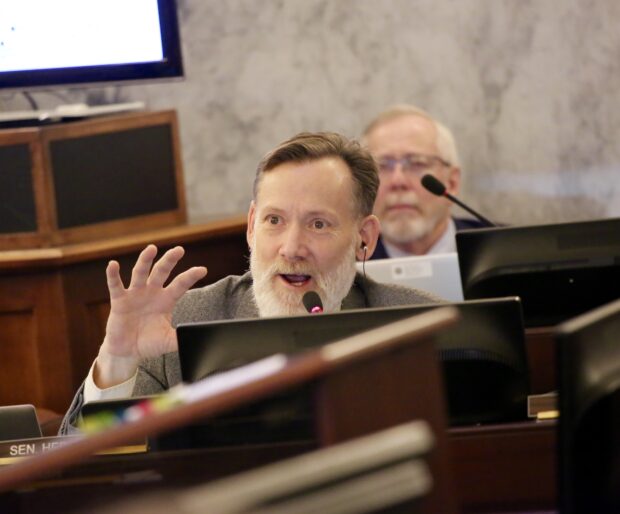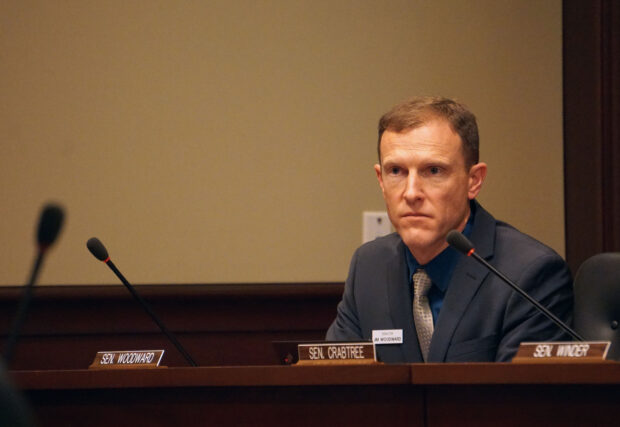This is the second in a series of stories spotlighting some of Idaho’s most important legislative primaries. Check back for more stories before the May 21 election, and read the first here.
Idaho’s northernmost legislative district is a political North Star.
It opens a window into the 2024 edition of the Idaho Republican Party’s continued internal strife. It also foreshadows what Idaho elections could look like in years to come.
The rematch between Sen. Scott Herndon and former Sen. Jim Woodward will probably be the costliest Republican primary in the state. It’s already one of Idaho’s most contentious primaries.
In legislative District 1 — which encompasses Boundary County and portions of Bonner County, a long and full day’s drive from the Statehouse — this race could still be won or lost on the ground.
Herndon is targeting the center-right voters who propelled his 2022 win, and says Woodward is courting a crossover vote. “Instead of pretending to be the conservative in the race, the other side is openly admitting that they’re running to the left,” Herndon said last week.
Woodward says he is getting more requests for yard signs this spring, suggesting a more energized base that is disillusioned with Herndon’s hardline politics, on everything from abortion to the West Bonner schools turmoil. “I think people had a taste of … the flavor of what the other option is,” Woodward said last week.
Legislative elections are, ultimately, local races. But this May 21 primary election could go a long way toward shaping the Senate GOP caucus, and have a tangible impact on Statehouse education politics.
The 2022 race certainly did.
What happened in 2022
It was one of the biggest headlines from a GOP primary packed with upsets.
Herndon, a Bonner County Republican leader, unseated Woodward, a second-term senator. The win represented a huge pickup for hardline conservatives who had long sought to have an increased voice in the Senate. It also suggested a shift in the dynamic in the Panhandle; Woodward was the hand-picked successor to longtime Sen. Shawn Keough, a mainstream Republican who co-chaired the Joint Finance-Appropriations Committee and now sits on the State Board of Education.
While the upset was resounding, it wasn’t particularly close. Herndon won with 56% of the vote, prevailing by more than 1,700 votes.
The win didn’t come cheap.
From Jan. 1, 2021 to the May 17, 2022 election date, Herndon raised $103,482. That translates to $13.32 per vote.
Woodward raised $86,859, or $14.32 per vote.
But the past predicts the future.
Woodward has already surpassed his fundraising totals from 2022. And with three weeks to go before the election, Herndon appears almost sure to do likewise.
Herndon’s record, and his priorities
After his election, Herndon replaced Woodward on two key committees.
He joined a cadre of first-term hardliners on the Senate Education Committee — which has pushed, unsuccessfully, for education savings accounts and private school tax credits that fall under the shorthand of school choice.

On JFAC, he aligned with a small group of hardliners that frequently pushed back against agency budget bills — and was frequently outvoted by moderates and Democrats on the panel.
On his campaign website, Woodward jabs at several pieces of Herndon’s voting record. Woodward says the education savings accounts bill — which passed Senate Education, with Herndon’s blessing — would have diverted $45 million “to a new program that lacks accountability.” Woodward also blasts Herndon for voting against career-technical education grants and for opposing Idaho Launch, a program that provides $8,000 grants for high school seniors pursuing in-demand careers.
Herndon defends his record. He says the ESA bill, roundly rejected on the Senate floor, would not have stripped money from public schools. He says the CTE grant bill also created a new state council that seemed unnecessary. And Launch, Gov. Brad Little’s pet postsecondary program, diverts $80 million in annual K-12 funding committed by legislators in 2022. “I mean, it’s a straight-up voucher for education postsecondary.”
If re-elected, Herndon plans to stay the course and build on his first term. He believes JFAC’s conservative wing helped embolden committee leaders to stick with a new process — one that allows lawmakers to pass large “maintenance” budgets and then give more scrutiny to followup bills that contain new line items. He also believes Senate Education’s staunch support has the Legislature “moving forward on a path for school choice,” while pushing to tie school funding to metrics, like reading and math skills.
For Herndon, the back-to-basics approach is personal. He studied finance in college and later went into software implementation; he has spent the past 19 years building houses. Instead of trying to measure college and career readiness, he wants Idaho schools to focus on foundational skills.
“I’ve had multiple careers that I learned as an adult,” he said. “So you have to have an ability to learn.”
Woodward’s record, and his priorities
A business owner with a degree in engineering, Woodward had a hand in education budgets and several pieces of education policy during his four years in the Senate. That list includes teacher pay raises and a budget line item that allows districts to move school employees under the state’s insurance plan, a shift designed to provide improved health benefits at a lower out-of-pocket cost.
But on his website, Herndon repeatedly refers to Woodward as a liberal. And Herndon cites a string of education issues: Woodward’s 2020 vote against a law banning transgender students from playing in girls’ sports; Woodward’s support of a $6 million-a-year federal early education grant, rejected by the House in 2021; and Woodward’s support of higher education budgets that allow spending on diversity, equity and inclusion programs.

Woodward defends his votes. The transgender athletics bill was legally flawed, and remains mired in federal court. The grant, from the Trump administration, would have allowed teachers, parents, nonprofits and schools to come up with local learning plans to help young readers. And the backlash against DEI runs counter to preserving intellectual freedom at colleges and universities.
“I don’t feel the need to oversee everyone’s thoughts on a campus,” he said. “That’s, I believe, another distinction between myself and Scott Herndon.”
If he returns to the Senate, Woodward says he would like to return to JFAC and Senate Education.
Woodward has some reservations about the changes in JFAC. He says the followup budgets are nothing more than a “scheme” that allow conservatives to kill some spending bills while still saying they supported maintenance budgets for schools or public safety.
If Woodward returns to Senate Education, he’s likely to be a consistent vote against school choice measures. He’d also be likely to take up an issue that was brewing when he was in the Senate before: revamping the school funding formula. He’d like to see a rewrite that would provide more funding for special-needs students.
This is actually one rare area of agreement between the candidates; Herndon also says he supports putting funding weights into a new formula. For Woodward, the issue is personal; his wife teaches at a local alternative high school.
“These are dinner-table discussions,” he said.
A costly race, and a GOP divided
$227,196.
That’s the bottom line, for the moment.
As of Thursday morning, Woodward has raised $130,207 for his war chest — including $20,000 he loaned to his campaign at the outset of the race. Herndon has raised $96,989.
The numbers will only go up from here. Both candidates must file an April report spelling out their monthly fundraising and spending activity. And under state law, all candidates must report maximum $1,000 donations within 48 hours of getting the money.
But while the figures will change, the storyline is well established. Donors, including Republican backers, sort out along unmistakable ideological lines.
Herndon taps into a decidedly conservative base. His donors include the Idaho Freedom Caucus PAC, aligned with the Legislature’s hardliners: Doyle Beck of Idaho Falls, an Idaho Freedom Foundation board member; Brent Regan, the Kootenai County Republican Central Committee chair and the Freedom Foundation’s board chair; and Larry and Marianne Williams, a prominent Boise couple that supports conservative Statehouse candidates across Idaho.
Woodward draws from a mainstream wellspring. His donors include a host of current and former legislators, including moderates such as Rep. Britt Raybould, R-Rexburg. He has received money from mainstream North Idaho Republicans, such as Keough. His donor base also includes industry support from Idaho Power and Clearwater Paper, and a recent $1,000 contribution from University of Idaho President C. Scott Green.
This donor divide is playing out in GOP legislative primaries across Idaho. But the sheer magnitude of the money is startling.
On a recent episode of Idaho Public Television’s “Idaho Reports,” the prospect of a $200,000 primary left even former Gov. Butch Otter flabbergasted.
“Raise my rent,” he said. “I can’t believe it.”
A signal of things to come?
Are Herndon and Woodward raising the rent for future legislative candidates in other corners of the state?
It’s too soon to know.
But while the District 1 Senate race is well on pace to be this year’s spendiest legislative primary, it’s not a race in isolation. According to Idaho EdNews research, 15 other legislative candidates have raised at least $50,000 this election cycle, through a combination of contributions and loans.
In another rare area of agreement, Herndon and Woodward make no apologies for their big-money campaigns.
“Those expenses come from the reality of a campaign, which is a marketing competition,” Woodward said. “You have to put your message out in front of everybody.”
“It’s not enough to have signs out and to go to forums,” Herndon said. “I don’t think everything’s gonna suddenly be more expensive for everybody. But I think if you really want to reach voters in a competitive and sophisticated race, it’s gonna take money.”
After two bitter primary cycles and (at least) $200,000 of campaigning, voters will settle this rematch. The outcome will reverberate well beyond a remote legislative district some 500 miles from the Statehouse steps.
Kevin Richert writes a weekly analysis on education policy and education politics. Look for his stories each Thursday.
More reading: Check out the candidates’ responses — and more from candidates across Idaho — at our online voter guide.
